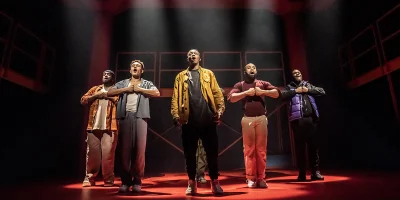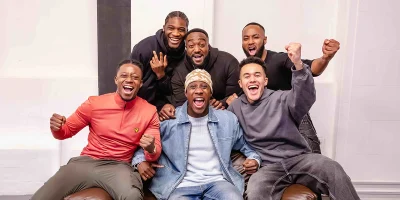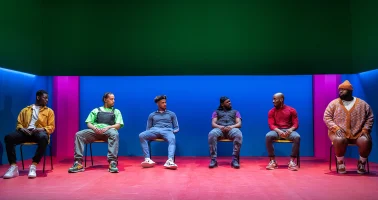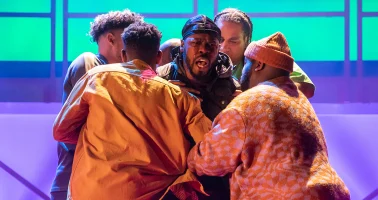
How the 'For Black Boys' cast want to change the West End's future
Three of the original sextet share what it means to introduce traditional audiences to new stories, as well as the importance of amplifying diverse voices in theatre.
Before For Black Boys Who Have Considered Suicide When the Huge Gets Too Heavy started its West End run at the Apollo Theatre, the play was already basking in glory. After a world premiere at the New Diorama Theatre, and a subsequent Royal Court transfer, Ryan Calais Cameron's reflection on growing up Black in 21st-century Britain picked up two Olivier Award nominations: Best New Play, and a collective nomination for Best Supporting Actor for all six actors.
Even though the show walked away empty-handed — the Best New Play award went to Prima Facie, and Patriots's Will Keen won that supporting acting category — the acknowledgement is enough for the cast to see the potential future transformations within the theatre industry.
"The amount of love that we received at the award ceremony, and people saying that we should have taken [the award] home? Now that makes me want to work even harder. It's a blessing to hear that we can cater for so many and open the doors and be like: listen, theatre is for everyone," said original cast member Emmanuel Akwafo.
Akwafo and his co-stars continue to work hard. All six Olivier-nominated actors return for For Black Boys in the West End – something that for Kaine Lawrence is "the peak of [their] careers." It's not only a personal peak though, as they acknowledge their personal growth now influences the future generations of theatregoers and creatives to hopefully programme diverse stories.
"People don’t see this play once. I can say that from experience," commented fellow cast member Darragh Hand. "Every time I talk to someone they're like, "Oh yeah, I saw it here or I saw it there."
So, what does it mean to be at the frontier of West End change? We spoke to Akwafo, Hand and Lawrence about being a part of the show from its humble beginnings, introducing new audiences to theatre, and why this show deserves its place on the national curriculum.
For Black Boys Who Have Considered Suicide When The Hue Gets Too Heavy is at the Apollo Theatre.
Book For Black Boys Who Have Considered Suicide When The Hue Gets Too Heavy tickets on London Theatre.
The play has a long, distinctive title. Can you summarise what For Black Boys is about?
Darragh Hand: The title does give a pretty solid insight into the things we delve into in the play — I always liked it for that. It always gets a reaction immediately when you hear something like that. If I had to summarise it, it's just an exploration of six young Black men in England, working their way through their experiences and trying to come up in a better place than where they started.
You performed at New Diorama Theatre, then at the Royal Court, and now you’re in the West End. What's it like to go on that journey together?
Kaine Lawrence: For a lot of us, this is our first gig we’ve done. And if it's not, then this is probably the biggest step. We've all been on the journey of the show together. But this is our careers, and we’ve reached the peak of it. It’s lovely to see the growth, cleaning, and polishing the show as we continue. It’s great to be in the West End.
Did you expect the show to be in the West End when you started?
Darragh: Kinda, yes and no. We knew that something was happening when we were showing it. The reactions we’d get from people [were] mad. People would come up to us, telling us the stuff they've been through — we knew it was important.
Whenever a show would near the end of its run, there’d always be conversations like “Oh, I heard this is happening.” So for it to get to the West End, it's not mad surprising, but it still is at the same time. You'd never actually know that you could actually put it on at the Apollo.
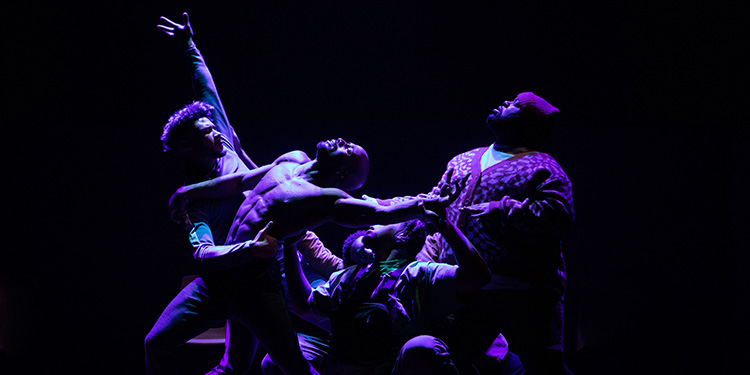
And then the cast were nominated for a joint Olivier. Where were you when you found out?
Emmanuel Akwafo: We were doing a singing lesson, and we broke up for 15 minutes. We were dispersed over the rehearsal room when our singing director John Pfummojena starts screaming. I thought, why was he screaming? And then slowly, people say “Oliviers,” but it didn’t really click until I got my phone. I saw that so many people had messaged me. And then we're also screaming and then Kaine came back from the toilet like, “What's going on?”.
Kaine: Yeah, I was on the toilet. It was crazy, man, I was screaming. But it didn’t hit me until later when I'm actually at home. I’m just laying in bed and people are posting we’re actually nominated for Oliviers.
Emmanuel: Even though we didn’t win, one thing I realised from the weekend is we're in such a blessed position to even have our nomination compared to other people in our industry. This was the first job that we did. We got nominated for a new play, and, we got recognised for supporting actor so we've done stuff that is out of the norm. Even for that to happen is a win in our eyes.
Kaine: They can keep the trophy. We’re breaking boundaries. We're on stage talking about things that they don't talk about. We're doing things that people don't normally do.
Have you had any unexpected feedback after West End performances?
Darragh: People don't get to feel like safe like this in a place like this. I've talked to one brother on press night. He told me he had to stay in the theatre because he said he wasn't ready to face the world yet. He said he felt so safe here, just in the audience. When the curtain came down, it took him a good 30 minutes to be like "Alright, now I have to face this world that doesn't make me feel like this."
Emmanuel: I feel like people can't help but invite you into their lives because the show has touched a nerve, or they realised something. People [have] stopped me because the show had made an impact on them so much. I could be in McDonald's. I could be in Sainsbury's. Someone will be like “Oh my gosh, I saw you” and they would want to speak.
If I can do anything to help them, I can. And if I can't, then I can always pass on information that I know of helplines that can help them — our website is constantly up where it gives information about if people need to talk.
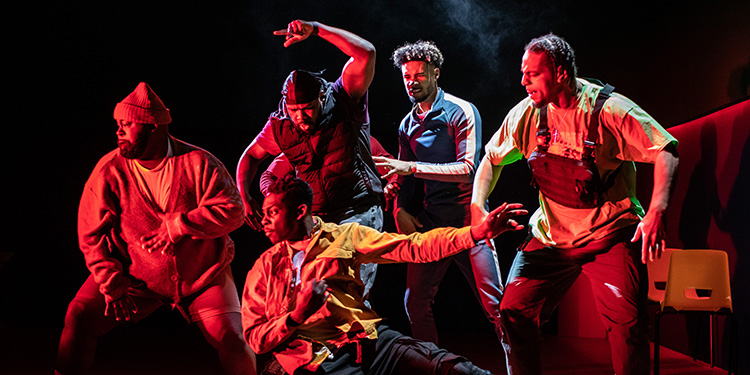
It must mean a lot to perform to new audiences who rarely see theatre as well?
Emmanuel: One hundred per cent. Growing up Black in the industry, I wish I could go to a theatre where I'm like, "Oh my gosh, I feel welcome. This is a show for me."
We're in 2023 and people are saying this is the new frontier of what theatre should be. It’s a really sad thought that it's taken a show like this to really shake up the West End and be like “Listen, this is what people want. And this is what should be happening.”
How do you maintain your emotional wellbeing?
Darragh: For me personally, it's just gotten easier, because it's the third time around. I learnt [from] the mistakes I made for the first time and the second time. This time around, it's just about listening when you can, but understanding that if it's your time to leave, then you just gotta do it.
You have to at some point say "OK, I can give up this much love or this much care." But once I hit that limit, it's easier to identify this time around.
The play deals with difficult topics. Where do you find the joy in telling these stories?
Darragh: There are moments when we laugh on stage. If you could hear us, it's actually joyful. Like it's actually fun. It's been like that since day dot, first rehearsal. We all just laughed throughout the whole process.
Emmanuel: We find the joy in making each other laugh and having moments where we can mess about and play around. Tristan [Finn-Aiduenu, original director] gave us the tools to use. Do you ever see Black men just playing?
Behind the scenes, and on stage, we remind ourselves that even though we are in such a heavy story, that we are human and we can learn from each other.
Why should people see the show?
Emmanuel: I’ll be honest, I feel like a show like this could be on the curriculum. When I was in secondary school, I did GCSE Drama, I watched Of Mice and Men at the Catford Broadway Theatre. Don't get me wrong, cool show. But it did nothing for me.
Then I was like, "You need me to write 500 words about the show? Lennie killed a mouse." If you take the students to For Black Boys, they’ll come back and be like “Miss, I wrote a whole essay” because they feel passionate. This could easily help so many people – curriculum wise, and therapy wise.
A lot of people go to the theatre to escape for two hours. And then they go back to the horrible world they live in. Now we need to take the next steps into how we help ourselves. That’s what makes us different from every show in the West End.
Photo credit: For Black Boys Who Have Considered Suicide When The Hue Gets Too Heavy (Photos courtesy of production)
Frequently asked questions
What is For Black Boys... about?
For Black Boys Who Have Considered Suicide When The Hue Gets Too Heavy returns to London’s West End in 2024 following three previously sold-out runs.
How long is For Black Boys...?
The running time of For Black Boys... is 2hr 35min. Incl. 1 interval.
Where is For Black Boys... playing?
For Black Boys... is playing at Garrick Theatre. The theatre is located at 2 Charing Cross Road, London, WC2H 0HH.
What's the age requirement for For Black Boys...?
The recommended age for For Black Boys... is Ages 15+ (recommended)..
How do you book tickets for For Black Boys...?
Book tickets for For Black Boys... on London Theatre.
Originally published on


